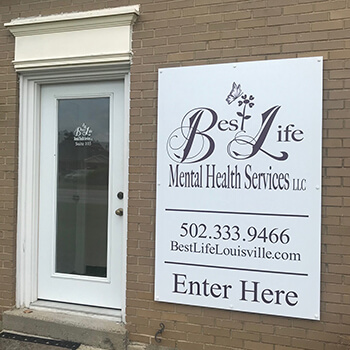Let’s be real—mental health medication has gotten a bad reputation over the years. The mental health stigma tries to label anyone on medication for mental health challenges as “crazy”. And on top of that, there is a fear around taking medication and what effects it will have long-term. As mental health professionals, who genuinely care about the Louisville community and helping people feel their best, we want to break these myths and stereotypes around medication management.
Don’t worry, we’re not trying to “push pills” as a cure-all for the problems that people face on a daily basis. But we do know that medication can play an important role in the treatment process for some people, and for that reason, we want to help spread education about the truth of mental health meds.
DISCLAIMER: There are many different types of treatment for mental health challenges and disorders. Medication is not the right fit for everyone but there are many who benefit from it. If you have questions, we are happy to talk with you about creating the right treatment plan for you.
Medication can play a part in mental health treatment
There are many types of treatment that exist to help with mental health challenges including the everyday stress and anxiety caused by difficult life situations and circumstances. In some cases, people will benefit the most through a combination of treatments. For example, taking medication and attending regular therapy sessions.
Sometimes when you’re struggling with the symptoms of things like anxiety and depression, it can be incredibly hard to overcome those symptoms. You may lack the motivation to do the tasks that will help you, even simple things like getting out of bed and eating a meal.
When you feel like this, you may attend therapy but continue to struggle to make progress. It’s not that therapy doesn’t work, it’s that sometimes medication is needed to help balance the chemicals in your brain. When this occurs, some of those tasks you couldn’t do before, start to feel possible.
As you start to feel better, it allows you to start to make the necessary changes in life and learn important strategies that can help you continue feeling your best.
Common misconceptions about medicine for anxiety, depression, and mental health disorders
There are a lot of myths floating around society about anxiety medication or medication for depression or other mental health disorders. It’s important to learn the facts so you aren’t falling for these misconceptions.
Myth: This pill will fix everything.
As we said above, medication can play an important role in treatment for some individuals, but there is not a one-size-fits-all treatment plan that exists. Medication for mental health is best used as one piece of the treatment pie while you also learn coping strategies and techniques that can help you make the most lasting progress.
At Best Life Mental Health Services in Louisville, we don’t believe in just writing a prescription and sending you out the door. Our providers believe in the necessity of comprehensive treatment and will work with you to find the best fit for your mental health needs. Not everyone who seeks therapeutic treatment will need medication, but an evaluation with one of our providers will help you to determine what may best suit your needs.
Myth: Once I start taking medication, I’ll have to keep taking it forever.
Each person’s experience and needs with medication for mental health challenges are different. There are some people who may benefit from taking medication long-term. However, there are also some people who benefit from taking medication for a short period of time.
If you feel that medication may be able to help you, but are afraid to be on it long-term, talk to a licensed medical expert about your situation. Our providers in Louisville can help you explore your options so together you can choose a treatment plan that is right for you.
Myth: I tried medication once and it didn’t work, so it just can’t help me.
There are many different options for medication based on your individual needs. You may need to switch which medication you are taking to experience the greatest benefits. In addition, it can take time for medications to begin working and for you to feel and experience the full benefits. If you stop taking it too early, you don’t truly know if it would have helped or not.
This is why it’s important to find a medical professional, like those on staff at Better Help, who will work closely with you to manage your medication. They should remain in contact with you to make adjustments if needed.
Myth: You have to have a serious mental health problem to benefit from medication.
This is a common myth about any type of mental health treatment, but it’s just not true. You don’t need to have a “serious” mental health challenge before you reach out for help. This includes therapy and the possibility of benefiting from medication.
In fact, the sooner you reach out for help when you’re struggling the better it can be for you. If you try to ignore it and wait, you may find that your symptoms are getting worse instead of better. Many times, just like with physical health conditions, challenges aren’t going to go away on their own. They require you to give them attention and seek the right kind of treatment.
This is a common myth believed by many people including those who feel they need to be strong and independent in life. But, the truth is, there are some challenges and obstacles in life that are much easier for us to get through and move forward from if we have the help of trained and experienced professionals.
Your life doesn’t need to hit a certain level before you reach out to explore your options for help.
Myth: I can stop taking it as soon as I feel better.
When your doctor prescribes you an antibiotic for a sinus infection they always tell you to keep taking the medication until you’ve taken all of it. They don’t want you to stop taking it when you feel better because they know that if you stop taking it too soon it won’t have time to do the proper work and you could more easily end up sick again right after because you didn’t fully address the issue.
Medication for mental health is similar. When you start feeling better or more like yourself, it’s a sign that the medication is doing its job. However, that doesn’t mean you should stop taking it. In fact, it means you should continue to take it because it’s helping. As mentioned earlier, this doesn’t mean you will need to take medication for the rest of your life, but you should never stop taking mental health medication without the assistance of a licensed medical professional.
Signs you may benefit from speaking to a Psychiatric Mental Health Nurse Practitioner.
Research has found that 45% of Americans with “clinical level mental health challenges” do not reach out for help. This statistic saddens us because it means those people aren’t getting the help they need. They are living with challenges that can be helped.
Please know that treatment is available for mental health challenges on all levels.
Here are some instances when you may benefit from scheduling an intake session at Best Life to explore your options for therapy sessions and/or a psychiatric evaluation:
- You’re experiencing symptoms that are impacting your ability to function at work, home, school, or in public settings
- You are participating in therapy sessions but your symptoms make it difficult for you to work on the practices and strategies between your sessions
- Even though you are getting treatment for your mental health diagnosis, your symptoms remain overwhelming and difficult to handle
- You’ve experienced a change in your moods, thoughts, and/or behaviors
- You struggle with negative or suicidal thoughts
In general, if you’re experiencing challenging situations and you don’t feel like yourself anymore, it can be a good indicator that it’s time to schedule an intake session to explore your options.
What happens during a “psychiatric evaluation”?
A “psychiatric evaluation” can sound a little intimidating but let us help put your mind at ease. During an evaluation, you will meet with one of our Psychiatric Mental Health Nurse Practitioners. They are trained and experienced in assessing and diagnosing mental health disorders as well as creating treatment plans and performing evaluations.
An evaluation includes things like sharing your medical and personal history, answering questions about your symptoms, receiving a physical exam and doing lab tests if necessary, and completing a questionnaire. Your answers and the results help the provider to better understand what you’re experiencing so they can determine what type of treatment can help you the most. It’s their goal to help create a plan with you, that gets you feeling your best.
We want to help you feel your best
Our goal at Best Life is to help the local Louisville community feel its best. We understand there are many challenges that come up in life including everything from diagnosable mental health disorders to everyday stress that impacts your ability to feel your best.
If you have been wondering if therapy or medication may help you with the challenges and symptoms you’ve been experiencing, schedule a call today. Our team can answer any questions you have and help you get on the path to feeling like you used to (or even better). Call us at (502) 333-9466 or use the button below to schedule online today.


